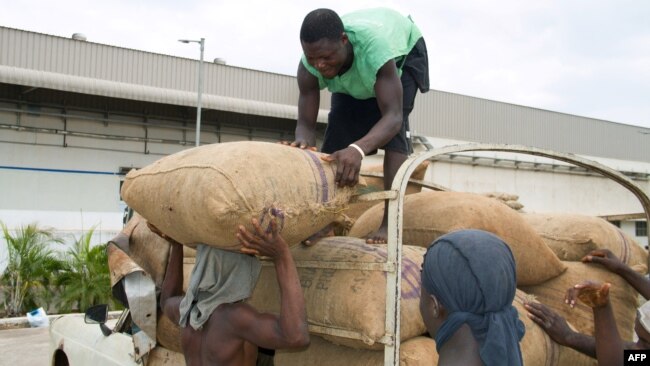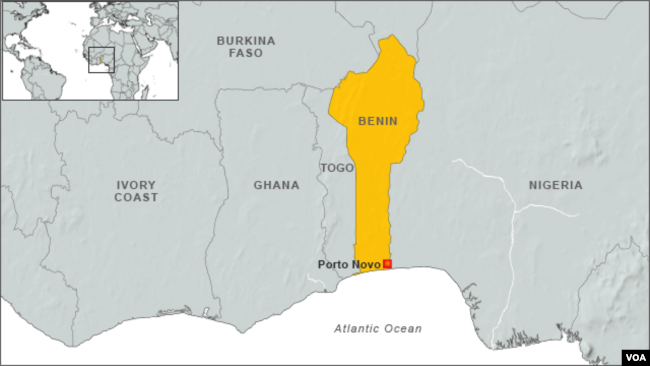면화 수출업체 베냉은 기후 배출을 줄이기 위해 현지 가공을 시도합니다.
Cotton Exporter Benin Tries Local Processing to Reduce Climate Emissions
페이지 정보
작성자 Henry Wilkins 작성일 22-11-18 17:10 댓글 0본문

파일 - 2019년 3월 29일 베냉 조그보도메이의 플루도르 공장 밖에서 근로자들이 캐슈넛 봉지를 트럭에서 치우고 있습니다. 베냉은 아프리카의 주요 캐슈 생산국 중 하나이며 캐슈를 가공하기 위해 수출하는 대신 현지에서 가공하는 새로운 산업 지역입니다.
FILE - Workers remove bags of cashew nuts from a truck outside the Fludor plant in Zogbodomey, Benin, on March 29, 2019. Benin is one of Africa's main cashew producers and a new industrial zone there is processing cashews locally instead of exporting them for processing.
지그베, 베냉 —입니다.
djigbe, benin —
세계 지도자들이 기후 변화에 대처하기 위한 방법을 논의하기 위해 이집트에서 만나면서, 한 가지 가능한 해결책이 베냉의 대륙 전역에서 준비되고 있습니다. 베냉은 원자재 수출에서 완제품 제조로 나라를 옮기기 위해 산업단지를 건설했습니다. 운동가들은 만약 더 큰 규모로 시행된다면, 이 추세가 지구 온난화의 원인이 되는 선박 배출을 줄일 것이라고 말합니다.
As world leaders meet in Egypt to discuss ways to combat climate change, one possible solution is brewing across the continent in Benin. Benin has built an industrial park to move the country away from exporting raw materials to making finished products. If implemented on a larger scale, activists say, the trend would cut down on emissions from shipping that contribute to global warming.
아직 건설 중이지만, IIP의 Glo-Digbé 산업 지역은 이미 캐슈넛을 가공하고 서양 시장을 위한 옷을 만들고 있습니다.
Although still under construction, Arise IIP’s Glo-Djigbé Industrial Zone is already processing cashew nuts and making clothes for Western markets.
완제품을 만드는 것은 아프리카 최대의 면화 수출국인 베냉에게는 새로운 일이며, 마를렌 케지클루논과 같은 현지인들에게 일자리를 제공하고 있습니다.
Making finished products is new to Benin, Africa’s largest raw cotton exporter, and is providing jobs to locals like Marlene Keziklounon.
그녀는 산업단지에서 일하는 것을 즐긴다고 말했는데, 의류를 만드는 것은 베냉에서 보통 가내 산업이기 때문에 예상치 못했던 일입니다.
She said she enjoys working at the industrial park, which was unexpected because making garments is usually a cottage industry in Benin.
"저는 항상 재단에 관심이 있었기 때문에 공원이 문을 열었을 때 관여하는 것이 제 목표였습니다," 라고 그녀가 프랑스어로 말했습니다.
"I was always interested in tailoring, so it was a goal of mine to get involved when the park opened,” she said in French.
경제학자들은 산업단지가 원자재의 수출과 완제품의 수입에서 지역 생산으로의 전환으로 아프리카의 미래를 형성할 것이라고 말했습니다.
Economists said industrial parks will shape Africa’s future as it pivots from the export of raw materials and import of finished products to local production.

아프리카 베냉의 지도입니다.
Map of Benin, Africa
만약 아프리카 대륙이 자체 제조업을 개발할 수 있다면, 그것은 아프리카 경제에 더 많은 돈을 주고 최종 소비자들에게 더 낮은 가격을 의미합니다.
If the continent can develop its own manufacturing, that means more money for African economies and lower prices for end consumers.
집에서 원료를 가공하는 것도 지구에 좋습니다, 라고 이 공단의 최고 경영자인 레톤지 베히튼이 말했습니다.
Processing raw materials at home is also good for the planet, said Letondji Beheton, the industrial park's chief executive officer.
Beheton은 "생 캐슈는 베트남으로 가는 대신 여기에서 처리되고 다시 유럽 시장과 미국 시장으로 돌아가 소비자에게 판매됩니다."라고 말했습니다. "그것만으로도 탄소 배출량을 줄일 수 있습니다. 그러면 면을 가져가세요. 같은 것입니다."
“The raw cashew is processed here and instead of going to Vietnam and then back to the European market and the American market to be sold to the consumers,” Beheton said. “That alone is allowing us to reduce the carbon footprint. Then, you take cotton. Same thing.”
세계은행은 기후 변화를 부추기고 있는 전 세계 온실가스 배출량의 3%를 국제 해운이 차지한다고 말했습니다.
The World Bank said international shipping accounts for 3% of global greenhouse gas emissions that are fueling climate change.
활동가들은 해외 가공을 위해 아프리카 원자재의 선적을 줄이는 것이 피해를 줄이는 데 도움이 될 것이라는 데 동의합니다.
Activists agree that cutting shipments of African raw materials for overseas processing would help reduce the damage.
Faig Abbasov는 유럽 연합의 녹색 정책을 구체화하기 위해 노력하는 캠페인 단체인 Transport and Environment에서 일하고 있습니다.
Faig Abbasov is with Transport and Environment, a campaign group working to shape the European Union’s green policy.
"우리는 한 국가에서 원자재를 생산하고, 가공하기 위해 다른 국가로 운송한 다음 최종 제품을 판매하기 위해 제3국으로 운송하는 경향이 있습니다."라고 Abbasov는 말했습니다. "원자재가 추출 지점에 더 가까이 가공되는 경제에 도달할 수 있다면, 불필요한 배출량을 상당히 줄일 수 있습니다."
“We tend to produce raw material in one country, transport it to another to process and then ship them to a third country to sell the final product,” Abbasov said. “If we can get to an economy where raw materials are processed closer to the extraction point, we can cut down quite a lot of unnecessary emissions.”
운송 감소의 전체적인 영향은 전세계 배출량의 일부이지만, 지지자들은 아프리카 제조업이 기후 변화와의 싸움에서 여전히 역할을 하고 있다고 말합니다.
While the overall impact of reduced shipping is a fraction of global emissions, supporters say African manufacturing still has a role to play in the fight against climate change.
출처 : VOANews
댓글목록 0
등록된 댓글이 없습니다.

















